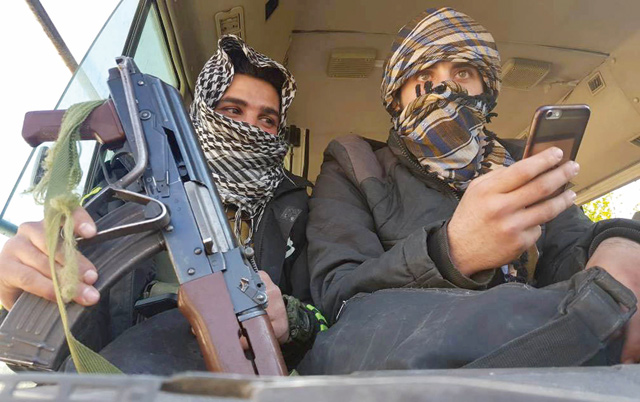BEIRUT, Lebanon — The expected loss of Eastern Ghouta will deal Syria's fragmented rebels their biggest blow yet, leaving them unable to threaten President Bashar Assad in Damascus and increasingly subservient to competing global interests.
Just weeks after their ill-fated uprising turned seven years old, Syrian opposition fighters have found themselves bussed out of their one-time bastion on the capital's outskirts.
They had overrun the suburb in 2012, setting up independent power structures that served around 400,000 residents and granted them a thriving popular base.
The three main factions — Jaish Al Islam, Faylaq Al Rahman, and Ahrar Al Sham — continually pledged to march on Damascus and rained rockets down on its residential neighbourhoods.
Weakened by a slow and painful half-decade siege, rebels could hardly hold out under weeks of bombing that culminated in negotiated withdrawals, a strategy polished by Syria's regime elsewhere.
"What happened is an absolutely huge loss strategically, militarily, and politically for the rebels. However you look at it, it's a total loss," says Nawar Oliver, an analyst at the Omran Institute.
"Just having a presence at the gates of the capital, near foreign embassies, was enough for rebels to impose themselves as essential players".
Even during Ghouta's dying days, its rebels maintained their deadly ability to lob mortar bombs and rockets on the capital, killing dozens.
It had granted them leverage for years, Oliver said.
"The regime had to talk to them, had to release prisoners, because they held the gates of the capital," he said.
"Now, they're nothing."
'Nowhere' is safe
After the crumbling last year of the Daesh terrorist group's "caliphate" in Syria and neighbouring Iraq, Assad's troops have shifted their focus elsewhere.
Helped by air strikes from steadfast ally Russia, Syrian troops are now in control of 55 per cent of the war-ravaged country.
Swathes of the north and northeast are held by Kurdish militia, and Daesh still holds small pockets in the country's centre and east.
The conventional armed opposition still holds most of the southern province of Daraa, a few towns in central Syria, and part of Aleppo province in the north.
They are also present in northwest Idlib, but their influence has been shrinking as extremist groups tighten their grip on the province.
Just like Ghouta, those areas have been designated as "de-escalation zones" meant to pave the way for a nationwide ceasefire.
But after Ghouta, nowhere is safe, Nawar told AFP.
"This is the essential thing the opposition knows now: nowhere is an exception," he said.
The evacuation deals that appear to have sealed Ghouta's fate were preceded by years of similar withdrawals, most infamously in December 2016 from second city Aleppo.
After a bombing blitz, tens of thousands of rebels and civilians were bussed out of their stronghold in the city's east in what was, at the time, their most devastating defeat.
"The fall of Aleppo was the beginning of the end, but Ghouta is more symbolic," said Thomas Pierret, a researcher at the University of Edinburgh.
At the time, mainstream rebels held more territory in Idlib, Homs, and around Damascus — and they still had Ghouta.
"At a rather symbolic level, there was this idea that we still have something. [Ghouta] was a meaningful challenge to the regime," said Pierret.
'Biggest loss'
Now, rebels across the country face three options, Pierret told AFP.
They could reconcile with the regime and join loyalist forces, or could throw their lot in with the opposition's main remaining backer — Turkey.
"The only alternative is the jihadi [extremist] option. The jihadists [extremists] would be the only group left fighting the regime and not directly under the control of another state," said Pierret.
Syria's conflict has drawn in a host of international players — including rebel backer Turkey, regime allies Russia and Iran, and the US-led coalition fighting Daesh.
The "Syrian National Army" — the Turkey-backed force tied to the political opposition — said Ghouta's rebels were welcome to join its ranks.
"Developments in Ghouta and elsewhere make us more insistent on maintaining and organising the SNA," said its spokesman Mohammad Abadeen.
Most of the fighters evacuated from Ghouta belonged to Faylaq Al Rahman, who would likely join ranks with Ankara-backed forces in Idlib and Aleppo.
Ahmad Abazeid, an independent Syrian analyst, said rebels in Ghouta's armed insurgency had been a rare case of more independent decision making.
"Ghouta's loss shrinks the opposition's manoeuvering space with these other powers, because they now need a foreign ally and civilians need an international umbrella to protect them from a similar campaign," he said.
"Aleppo is Syria's second city, but Damascus is the capital — and losing Ghouta represents the biggest loss in the history of the Syrian revolution," said Abazeid.
